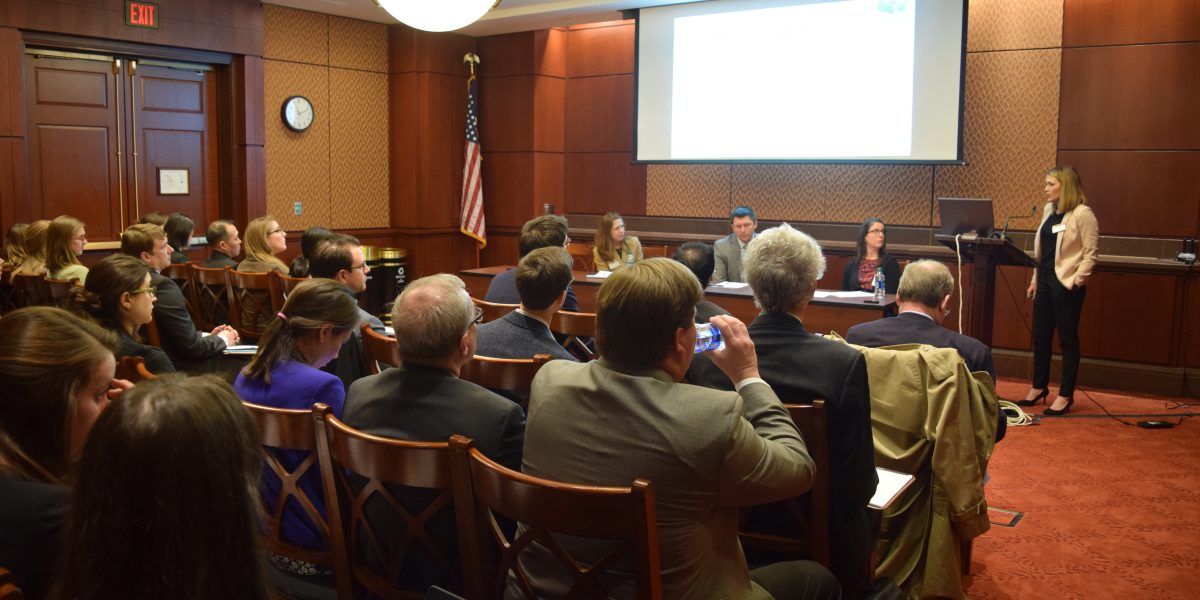The 2017 Gulf Hypoxia Task Force Report was the focus of a Northeast-Midwest Institute briefing on Capitol Hill on January 31. Nutrient pollution in the Mississippi River and the Gulf of Mexico were the central focus as well as what the Task Force has done to build long-lasting relationships with various agencies and stakeholders to address the issue.
The panelists, from universities as well as state and federal agencies, discussed the Task Force’s 2017 report, including many important science-based conclusions that are relevant to upcoming pieces of legislation, such as the Farm Bill. The briefing provided an opportunity for Congressional staff and other interested stakeholders to learn about the report and the ongoing efforts to shrink the annual dead zone in the Gulf.
A full, timestamped audio recording of the briefing can be found here.
The slides used during the briefing can be found 18.01.31-Hypoxia-Briefing-Full-Combined-Presentation.pdf">here.
More information about the panelists can be found 18.01.31-Hypoxia-Briefing-Panelist-Flier.pdf">here.
Katie Flahive, an agricultural engineer with the EPA’s Nonpoint Source Management Branch, introduced the background of the Task Force and its report. Her remarks focused on nutrient reduction strategies as well as the efforts of federal agencies to provide state and basin-wide connections and partnerships.
Matt Lechtenberg, Water Quality Initiative Coordinator for the Iowa Department of Agriculture and Land Stewardship, provided a state-based perspective from Iowa regarding strategies and water quality initiatives. He stressed state recommendations, especially in regard to the Farm Bill and long-term sustainable funding.
Dr. Amanda Gumbert, University of Kentucky Extension Water Quality Specialist, discussed the relationship between Land Grant Universities and their collaborative work with the Hypoxia Task Force. She also discussed SERA-46, the Southern Extension and Research Activities committee number 46, a cooperative effort between the USDA and Land Grant Universities. Their three focus areas revolve around strengthening networks, conservation systems research and outreach, and monitoring and tracking of progress.
Dr. Beth Baker, Mississippi State University Assistant Extension Professor, continued addressing SERA-46, describing valuable collaborations such as direct farmer and farm advisor interaction and the state and federal agencies represented by Hypoxia Task Force membership. She elaborated on their future efforts, including the expansion of economics as a shared priority and research and education on multifunctional agricultural landscapes.
This briefing was hosted by the Mississippi River Basin Program (MRBP) at the Northeast-Midwest Institute. Launched in 1995, the MRBP envisions a Mississippi River Basin where livelihoods and the economy can thrive alongside conserved wetlands, restored floodplains, resilient ecosystems, and clean streams. Recognizing the role of informed policy debate in achieving this vision, the MRBP strives to provide detailed research and analysis to policy makers at all levels of government, and facilitates discussion and exchange among lawmakers and the region’s stakeholders.
The Northeast-Midwest Institute is a Washington, D.C.-based, nonprofit, nonpartisan public policy organization committed to economic vitality, environmental quality, and regional equity for the 18 states of the Northeast and Midwest.
